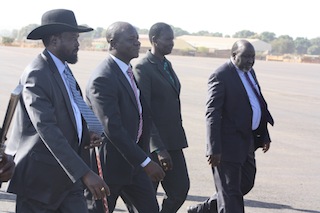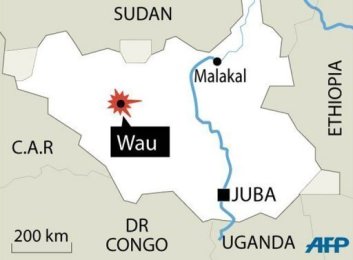South Sudan president Kiir backs relocation of Wau county headquarters
December 24, 2012 (WAU) – South Sudan President Salva Kiir Mayardit instructed the army Monday to immediately take control of situations when the police are unable provide security; such as the recent violence in Wau.

Kiir said that the controversial the decision of the Western Bahr el Ghazal cabinet to relocate administrative headquarters of Wau County, which has caused protests and clashes with police, would not only benefit the local population.
Speaking to a large crowd on Monday, Kiir said that the Governor Rizik Zachariah Hassan had not take the decision to relocate the county headquarters alone; he was simply implementing the policy of South Sudan’s ruling party.
“It is the policy of the SPLM to take town to our people in rural areas and must be implemented. And if there are people who refused and was the reason they caused chaos that resulted to the loss of lives of innocent people, they must live with this reality”, Kiir told crowd in an authoritative tone.
The visibly annoyed the President said he would have fought with the people who refused transfer of the administrative headquarters from Wau town to Bagari if it was the reason for fighting.
On 8 and 9 December, eight people were killed, according to the government, when police attempted to remove road blocks around Wau that had been established in protest against the transfer of the administrative centre.
Al Jazeera English | Protestors shot at by South Sudan army | 13 December 2012

The United Nations Mission in South Sudan (UNMISS) initially put the death toll at ten before revising this down to nine. Former Wau County commissioner, John Peter Miskin, claimed that 25 people were killed and 21 others were wounded in the protests two weeks ago.
Ten days after the initial violent protests a further 12 people are reported to have died in the second protest on Tuesday 18 December with more people wounded. However, South Sudan’s deputy interior minister, Salva Mathok Gengdit, said that only seven people died and 32 been have been wounded in that incident.
Despite the opposition Kiir said: “The cabinet decision was the right choice which the governor has made. It will benefit people in so many ways. It will take services closer to the people”.
“The county headquarters will not function in isolation of essential services providing institutions. There will be [a] police unit. There will be health facilities. There will be schools. There will be road connecting the county to the state and agricultural extension services will be provided when agricultural extension officers are deployed to the county”, Kiir told the crowd at Wau football Stadium.
While in Wau, Kir addressed various groups, including top-level military and police officers as well as representatives of the diplomatic communities and religious leaders after his heavily guarded arrival on Monday.
“The SPLA should immediately take charge in the situation where police is overwhelmed to provide and maintain adequate security until when police is able to handle it”, Kiir told the army.
He called on traditional leaders and youth groups to avoid being used by politicians and instead strengthen traditional values and ancestral relations among community members in the state. He urged the state administration to arrest those suspected of instigating the protest and the killing of innocent Dinka civilians in Parajallah locality in Bagari area.
The attack on civilians 48 miles south west of Wau town in Parajallah killed 26 people according to local authorities, when Balanda youth groups set upon migrant workers from the Dinka tribe carrying traditional weapons, including sticks and hurling stones.
Authorities initially have arrested eight suspects in connection with the deaths in Parajallah, which is located in the Bagari area; the proposed new location for the headquarters Wau County.
Bagari is inhabited by the Balanda tribe, also known as the Fartit, whose youth groups and intellectuals have rejected the proposed relocation of the Wau County administration.
Reacting to the Parajallah killings Kiir condemned “this culture of killing people because of their identity” asking: “Where did this culture of killing innocent people come from? Where did this culture of hacking people come? If you have already killed people why again cut them to the extent that you even cut their private parts. You cut women, killed children and put them to feed on dead mothers. People have been crucified like the way Jesus was killed. Why?”
“This is strange and must not be entertained. Those who instigated this must be identified and brought to book”, he instructed.
Kiir directed the security apparatus to help the state administration identify the suspects and called on legislators to educate their constituents to observe their rights as enshrined in the national transitional constitution.
Meanwhile, traditional leaders from different communities in Western Bahr El Ghazal State expressed condemned the recent violence and called for peaceful co-existence. Chief Joseph Stephen Fougi from the Kalfario Fartit group condemned the killing of innocent civilians, calling for thorough investigation. He said Fartit tribes have no problem with other tribes and that they are committed to the Mabil Peace Accord that prohibits violence.
Chief Santo Deng, a member of Greater Bahr el Ghazal Community Association described the incidents as sad and that perpetrators must be arrested. Wau’s communities are very peaceful, Deng said, and have no problem with each other. He pledged commitment to work with the state government to track down the perpetrators behind the violence and all other incidents. He appealed to all communities in the state to respect each other and maintain law and order.
Speaking at the same gathering, Governor Rizik Zachariah Hassan commended the governors of the states neigbouring Western Bahr el Ghazal for showing solidarity during the crisis. The group that killed the 26 innocent civilians in Parajallah were a militia group that must be tracked down and brought to book with immediacy, he said.
“Our president, allow me [to] tell you that what happened was not just a mere expression of an opinion by the citizens. It was [a] clear act of criminality. Those who killed innocent civilians in Parajallah are rebels and they must be hunted and brought to book immediately. The committee has been formed and they are being hunted”, Hassan said.
Western Bahr el Ghazal’s Minister of Health, Michael Milly Hassan, who was part of the presidential entourage who spoke at the gathering to welcome Kiir, said “he was shocked” by the incident and called on the community to follow the rule of law.
Hassan said Western Bahr el Ghazal was badly affected by the decades of civil war that preceded South Sudan’s independence last year and people were “still traumatised”. He called for the establishment of peace and reconciliation committees in the state to address differences the tribes of the area.
Hassan is a member of the Balanda community whose intellectuals and youth groups have rejected relocating Wau County headquarters to Bagari, some 12 miles southwest of Wau town. The minister has kept a low profile, while some prominent figures in his community including senior military officers have been implicated in the protest by security reports.
Kiir will also meet with the Governor of Warrap State Nyandeng Malek, Governor of Lakes State Chol Tong Mayay and top-level military and police officers. The President held meetings with the state security committee, as well as the peace and reconciliation committee. He also held meetings with youth representatives and traditional leaders.
The president also opened Wau airport during his six hour stay in Western Bahr el Ghazal.
(ST)

